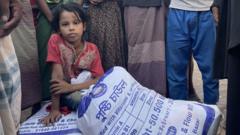Kajol's fight against tuberculosis has turned into a struggle for life, as USAID's recent cuts threaten vital healthcare support in Bangladesh. The 17-year-old garment worker, who is the sole provider for her family, was diagnosed with TB in January. Until recently, the local initiative, funded by USAID, provided necessary treatments and nutritional support. However, a recent decision by the Trump administration to terminate most US aid programs has halted this essential assistance, disrupting her treatment cycle.
Tuberculosis, a deadly airborne disease, predominantly affects the poor in regions like Dhaka's Mohammadpur slum, where many lack access to healthcare. Dipa Halder, an aid worker with Nari Maitree, emphasizes the plight of vulnerable residents who are now left to navigate their healthcare amidst financial constraints. The abrupt cessation of medicines increases the risk of drug-resistant TB and further health complications.
Reports indicate that USAID played a crucial role in identifying and treating hundreds of thousands of TB cases in Bangladesh. However, the drastic funding cuts—dropping from $500 million to just $71 million in foreign assistance—have led to the cessation of multiple health programs, leaving those reliant on them, like Kajol and her family, without critical support.
The expeditious elimination of initiatives has also forced aid workers like Dipa into unemployment. Concern not only looms for individuals like Kajol but for the broader NGO workforce, which comprises around 500,000 jobs in Bangladesh. As the country faces economic turbulence, the government has promised to strategize on bridging the funding gap, although concrete plans remain vague.
The effects of the funding cuts are particularly evident in Cox's Bazar, home to the world’s largest refugee camp housing over a million Rohingya refugees. The immediate cessation of programs previously funded by USAID has led to dire shortages in food and medical supplies, exacerbated by an outbreak of cholera and rising health crises. With the United States historically providing nearly half the humanitarian assistance to these refugees, the withdrawal is expected to worsen their already precarious situation.
Aid organizations like UNICEF are struggling to secure necessary resources, with reports of severe cuts to food rations, compounding the struggles of families like that of Rehana Begum. As concerns escalate over a potential security crisis due to desperate conditions within camps, the repercussions of USAID’s funding reductions will likely resonate deeply within the fabric of Bangladeshi society, putting countless lives at risk.























